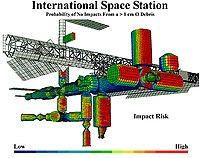
Photo from wikipedia
Abstract This study examines the relationship between earnings quality and analysts’ information environment as measured by analysts following, analysts’ forecasts dispersion, and analysts’ forecasts accuracy. Using a sample of all… Click to show full abstract
Abstract This study examines the relationship between earnings quality and analysts’ information environment as measured by analysts following, analysts’ forecasts dispersion, and analysts’ forecasts accuracy. Using a sample of all non-financial listed firms in the 15 European Union (EU) member states, we find that higher earnings quality leads to more analysts following, less dispersion of analysts’ forecasts, and more accurate forecasts from analysts. We also provide evidence of a positive link between the strength of this relationship and both International Financial Reporting Standards (IFRS) and the strength of enforcement regimes in EU countries. Further, we find that the innate component of earnings quality dominates the effect on analysts’ information environment proxies, whereas the discretionary component is likely to have a negligible impact. These findings shed light on the vital role of earnings quality in helping analysts and investors to make better financial investment decisions.
Journal Title: Journal of International Accounting, Auditing and Taxation
Year Published: 2021
Link to full text (if available)
Share on Social Media: Sign Up to like & get
recommendations!